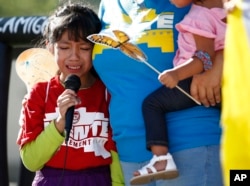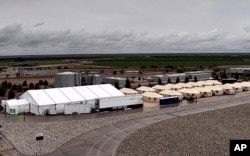Over 2,300 children were separated from their parents at the U.S.-Mexico border between May 5 and June 9 under the Trump administration’s “zero tolerance” policy, U.S. Customs and Border Protection said on Tuesday, and immigration advocates and legal experts say there is no clear system in place to reunite them.
The policy directs border officials to refer for prosecution all immigrants apprehended while crossing the U.S.-Mexico border illegally.
Parents who are no longer detained “are entitled to get their kids back through a documented process,” U.S. Department of Homeland Security Secretary Kirstjen Nielsen said.
When are children and parents separated?
Immigrants arrested near the southwestern border are taken to processing centers where officials refer some to federal court to be prosecuted under the U.S. criminal entry statute.
Parents referred for prosecution are transferred into U.S. Marshals custody and separated from their children.
Immigrants charged with the misdemeanor crime of illegal entry often plead guilty in group hearings and receive a sentence of a few days in prison or “time served,” at which point they are transferred back to a processing facility and quickly deported unless they claim a “credible fear” of returning to their home country.
Meanwhile, their children are transferred into the custody of the Office of Refugee Resettlement (ORR), part of the Department of Health and Human Services, which manages facilities that care for minors. There are 100 sites scattered across 17 states and they can be on the other side of the country from their parents.
Children get their own case in immigration court and are entitled to a full hearing by an immigration judge, a process that can take months.
How can parents contact their children?
U.S. Immigration and Customs Enforcement (ICE) said it has posted information in all facilities at which parents are detained for over 72 hours, advising them to call a hotline for assistance in finding their child. The agency said it will work together with ORR to locate separated children, verify the relationship and set up regular communication and removal coordination if necessary.
There are two hotlines, one run by ICE and one by ORR.
Advocates say the wait times on these calls can be upwards of 30 minutes and parents are required to call back when a child cannot immediately be located.
How can the parents be reunited with their children?
ICE said it “will make every effort to reunite the child with the parent” once the parent’s case has been adjudicated.
If the parent is being deported, ICE said it will work with ORR to reunite them with their child at the time of deportation and with the consulate representing their country to assist the parent with obtaining a travel document for the child.
In some cases, the parent may decide they want their child to stay in the United States to pursue their own asylum claim, or the child may themselves choose to seek asylum. In other cases, children may ask to return to their home countries to be reunited with their parents.
Advocates said the reunification process is ad hoc.
Anthony Enriquez, director of the unaccompanied minors program for Catholic Charities Community Services in New York said there was no systematic effort in place to ensure the children and their parents are reunited.
“I go to court to tell the judges this under oath,” Enriquez said. “There’s no process.”
He said reunification relies on individual government officials who go above and beyond their duties to help the families reunite or a lawyer from a non-governmental legal organization doing that work.
Robert Carey, who ran the Office for Refugee Resettlement under President Barack Obama said he would be surprised if systems were in place for reunifying families as the new zero tolerance policy was put in place quickly and “it takes time to coordinate across multiple agencies.”
Have parents been deported without their children?
Immigration attorneys say there have been many cases of parents deported without their children. The advocacy group Kids In Need of Defense (KIND) said of the 40 case referrals involving family separation they have received since July 2017 through their child migrant return and reintegration project, 32 involved parents deported before their children and 15 of those cases involved children who were five years old or younger.
In some cases, parents are deported before finding their children in ORR custody, said Lisa Frydman, a KIND attorney.
“We’ve had other cases where the child goes to ORR and they do not know where parent is, and the parent doesn’t know where child is,” Frydman said.
Some children remain in the United States months after their parents are being deported, she said. Parents who have been deported back to countries such as Guatemala and Honduras without their children are reaching out to local organizations asking for help locating them.









